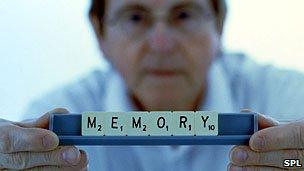Memory is 'team effort' by several regions of the brain
- Published

Researchers say the study uncovered an important brain circuit
Remembering where we left our keys requires at least three different regions of the brain to work together, a study published in the Journal of Neuroscience says.
The hippocampus, perirhinal cortex and medial prefrontal cortex all have specific roles in memory processing.
But University of Bristol researchers say the hippocampus is crucial for remembering an object's location.
An Alzheimer's expert say it provides another insight into the brain.
Working on rats, the team of neuroscientists carried out experiments to examine the role of hippocampus in recognition memory tasks.
In other experiments they also looked at how the hippocampus interacts with two other regions of the brain, namely the perirhinal or prefrontal cortex.
These experiments revealed that neither "object-in-place" or "temporal order recognition" memories could be formed if communication between the hippocampus and either the perirhinal cortex, or the prefrontal cortex, was broken.
Dr Clea Warburton, co-author of the study and reader in cognitive neuroscience at the University of Bristol, said the study had discovered an important brain circuit.
"In normal day to day life we are all collecting information within this brain circuit, which may involve other bits of the brain too.
"If we recognise somebody in the supermarket but can't remember their name it may be because we are used to seeing them somewhere else, like work."
Dr Warburton said this failure of memory can happen for a number of reasons.
"Processes can suffer as normal people age, because we are busy, don't have time or because one bit of the brain circuit is breaking down.
"Then we need to use strategies for processing information better.
"We could repeat the name aloud when we are introduced to someone new or encode a feature of their face or hair - something which will help us encode it more deeply in our memory."
The researchers said their findings could have implications for understanding memory and treating people with memory disorders.
Dr Simon Ridley, head of research at Alzheimer's Research UK, said it was too early to say how the findings could help research into Alzheimer's disease and other forms of dementia.
"It is important that we understand the complexities of the brain and this discovery brings another insight.
"We desperately need new preventions and treatments to defeat dementia but research funding lags far behind other serious diseases - with 820,000 people affected across the UK, substantial investment is needed now."
- Published1 February 2011